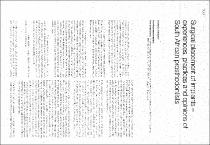Surgical placement of implants – experiences, practices and opinions of South African Prosthodontists
Abstract
It is generally accepted that dental implant-treatment is "restorative" driven: the virtual blueprint of a prosthesis determines the position and number of implants to be placed. Competent interdisciplinary team-work is essential for the successful completion of implant-retained restorations. The purpose of this survey was to determine the experiences, practices and opinions in terms of the surgical placement of implants among South African prosthodontists.
Methods: A questionnaire was e-mailed to a sample of South African prosthodontists. Data were collated and analysed using Epilnfo. Statistical significance was set at 0.05 and strength of association was determined by means of measurement of relative risk (RR) and chi-squared test or Fisher's exact test.
Results: The response rate was 49%. The majority of respondents were male. Mean age was 50 years and all treated patients with implant-supported prostheses. Most implants were placed by non-prosthodontists (surgeons/ periodontists) and the majority of prosthodontists reported that they were generally satisfied with implant placement by other specialities. Six prosthodontists reported that they surgically place implants themselves. Of those not placing implants, five reported that they would like to do so. Younger prosthodontists, those who had attended short courses and those who considered their "surgical training" to be adequate, were more likely to place implants themselves or to want to do so.
Conclusion: This survey identified areas for further research into the dynamics that may cause changing habits in the management of implants in prosthodontic practices, and carries the mplication that the scope of practice of the different specialities should be continuously evaluated and adapted, to the ultimate benefit of the patient.

